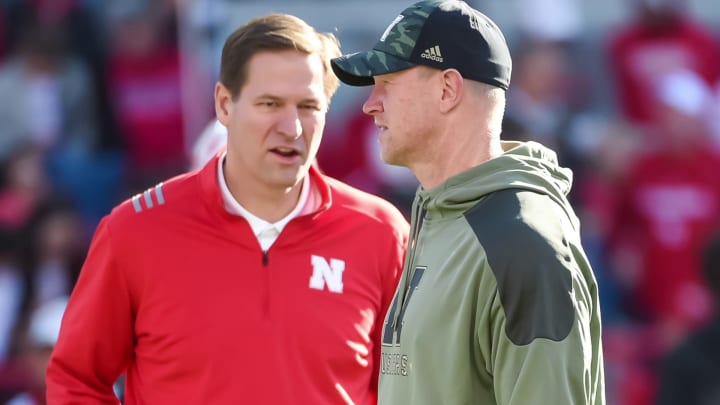Stryker: The Fruits of Loyalty

How important is loyalty, and how far should it go?
Nebraska football fans built a reputation for loyalty throughout the Devaney-Osborne era as they built a Memorial Stadium sellout streak that continues to this day. Husker volleyball fans, who ramped up their expectations as Terry Pettit built that program, are still enjoying their Golden Age under John Cook, the best current head coach in Lincoln, and the Devaney Center sellout streak rolls on.
Loyalty abounds at the grassroots level in Nebraska, the second-lowest-populated state with a Power Five football team. Husker fans know what it means to be loyal to a winner, although their loyalty is now being tested like never before, after two favorite sons came home to coach their football and basketball teams and fell flat on their faces. In fact, over the past four seasons, it’s astounding that Husker fans have supported their two major revenue sports as well as they have while receiving so little in return. Although some may be holding their noses, Husker fans are passing the test. Loyalty means financial health for the beneficiary. Just before the COVID-19 pandemic struck, Nebraska’s athletic department was doing quite well, generating a healthy profit in football (approximately $60 million annually) and men’s basketball ($6 million) and keeping its nose just above water in volleyball. NU is one of only a handful of schools nationwide that have three teams operating in the black.
Nebraska fans tend to support their teams to the nth degree. It begs the question: Is there an overabundance of loyalty in Husker Nation? Too much passion and not enough prudence? Are Husker fans failing to hold their lowest-performing teams accountable?
In 2021, despite a fourth consecutive losing season under Scott Frost, Nebraskans bucked the nationwide trend of declining football attendance. They kept showing up at the stadium, checking in at 86,173 per game, making the Huskers No. 10 in the nation for attendance. Basketball games at Pinnacle Bank Arena were sold out in 2021-22, although the ineptitude of Fred Hoiberg’s team (which has won just one conference game this season) has prompted a lot of folks to stay home. Still, with scanned tickets topping the 60 percent mark most games, that seems to me a tremendous amount of loyalty to a team that seems to prefer street ball and at times looks clueless about how to play defense. There is an end to patience, however. A lot of boos from frustrated fans rang out at PBA during the Northwestern game a few weeks ago, when the Huskers were even more incompetent than usual.
There have been similar low points in football, starting in 2007, and becoming more frequent a decade later. Memorial Stadium started clearing out at halftime of the 2017 Ohio State and Iowa games, both 56-14 beatdowns during the final year of Mike Riley’s tenure. It’s not as though Husker fans are unquestioningly loyal; eventually, they will vote with their feet. That will happen again this fall if things don’t improve quickly and decisively on the gridiron.
Discussing football attendance seems to elicit a lot of passion, if sports talk radio is any indication. Some folks think the sellout streak should go, that it’s the one remaining reminder of past greatness, and it puts too much pressure on the players. I disagree. If you follow that line of reasoning, Nebraska football should have done much better than 3-5 in 2020, without the “pressure” of thousands of fans in the stands supporting them. The players should embrace every remaining ember of fading Nebraska greatness that they can absorb, and do what they can to fan it back into flame.
Loyalty is certainly evident at the top. Athletic Director Trev Alberts, who would have been justified in firing both Frost and Hoiberg by now, instead has dealt rather generously, but prudently, with both. I think Alberts has struck the right balance here. In retaining both coaches while negotiating salary cuts and reduced buyouts, he has prepared as well (or better) than could reasonably have been expected for the eventual worst-case scenario, while giving both coaches a fighting chance to build their own best-case scenario. In the process, he sent a clear message that Nebraska no longer is a place that runs off nine-win football coaches. NU athletics is trending back toward stability, where it used to live, and Husker head coaches — both present and future — know that Alberts will have their back. Alberts’ clear thinking, integrity and high standards are blessings for the university.
Frost and Hoiberg, to their credit, both showed at least a measure of loyalty to Nebraska players and fans, and the athletic department that employs them. Both could have refused to renegotiate, and demanded every last dollar they were owed. They decided they owed Husker fans something greater, indicating that, despite their faults and missteps over the past few years, both are honorable men who want to help the Cornhusker brand succeed. Indeed, Alberts pointed out that Frost’s own loyalty was a factor in his decision. Both coaches came to the Big Ten as mavericks, with Frost hoping that he could make the conference adjust to his offensive style, and Hoiberg essentially doing the same thing, without as much public fanfare. Both have run into problems trying to implement their preferred style of attack. How will they respond?
Frost has taken difficult but necessary steps, including firing some of his best friends and bringing in more seasoned replacements, most of whom are better recruiters, to turn around the football program. It remains to be seen if Hoiberg will buy into similar concepts with his strategy and staff. Will he admit it takes long-term thinking, such as recruiting and developing a big man and a point guard, to win in the Big Ten? Does loyalty mean having to give up your ideas and adopting someone else’s? Coaching has always been a copycat profession, and when you’re not gaining ground, it’s prudent to admit you need to try something different.
It seems to me that Nebraska athletes generally have been quite loyal to their teammates and their coaches, although on this count, it’s harder to make that case for Hoiberg’s players than Frost’s. Hoiberg needs to change his style, which comes across as short-sighted and mercenary. It’s one thing to take a few transfers at positions of need, quite another to build your entire program on them. No matter how you feel about Adrian Martinez, it’s beyond dispute that for four years, he gave everything he could to the Huskers and their fans. The same is true for Austin Allen and Cam Jurgens.
It’s reasonable to say that Husker players could be more committed to the concept of doing what it takes to win games. Will they truly be team-oriented? Or will the most talented of the bunch be thinking more about NIL and NFL than NU? I think the answers to these questions ultimately rest more on coaching and leadership from the top, but peer leadership by upperclassmen is also vital. There was a gradual shift in the right direction in Frost’s locker room last fall. Hopefully that becomes a decisive trend in spring drills, summer workouts and fall camp. I think we’ll be able to judge the results for both football and basketball within a year.
Loyalty is valuable when it leads to year after year of doing things the right way, including taking responsibility and earning trust, when it’s reciprocated at every level of every program. Ultimately, it must lead to competitive greatness, something each Husker fan must continue to demand.
